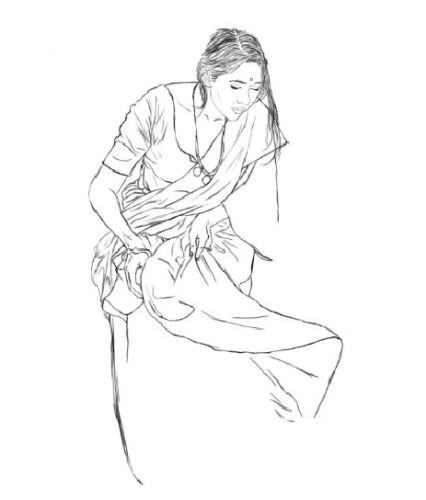The Dowry is a short story by Nobel Laureate Rabindranath Tagore. Originally titled Dena Paona, this short story is one of his most celebrated and oft quoted works. It is part of Tagore’s Galpaguchchha, an anthology of long and short stories. It has been translated into English by Ruma Chakravarti.
When a daughter arrived after five brothers, her parents named her Nirupama, (the Incomparable). Such a fanciful name had never been heard in this family before. The general trend so far had been to name children after the gods – Ganesh, Kartick, Parvati etc.
We enter this story as Nirupama’s marriage is being planned. Her father Ramsundor Mitra had been looking far and wide but none of the grooms were to his liking. Finally he found a prospective husband, the only child of a great official, a Raibahadur. Even though the family had lost most of their former wealth, they were still aristocratic in their tastes.
They demanded ten thousand rupees and a large number of gifts as a dowry. Ramsundor agreed to these conditions without giving it much thought, after all it would be insane to lose such a son-in-law.
He found it very difficult to borrow the money. Even after pawning and selling off many of the family possessions, he was still short of six to seven thousand rupees. In the mean time the day of the marriage drew closer.
This unfortunate turn of events caused a wailing to break out in the inner rooms of the house. The person who was the chief reason behind this mishap was sitting quietly wrapped in a red silk saree and jewellery, her forehead smeared with ritual marks in sandalwood paste.
Finally the day of the marriage dawned. A lender who had agreed to give Ramsundor the money he needed but at a very high rate of interest failed to materialize. There was a tremendous uproar where everyone was assembled. Ramsundor prostrated himself at the great official’s feet saying, ‘Let the festivities be completed, I will surely give you the money in full.’
The official declared, ‘The groom will not sit down for the ceremony unless we are given the full amount.’
This unfortunate turn of events caused a wailing to break out in the inner rooms of the house. The person who was the chief reason behind this mishap was sitting quietly wrapped in a red silk saree and jewellery, her forehead smeared with ritual marks in sandalwood paste. I cannot say that she was feeling a great sense of respect or love towards her would be parents-in-law.
In the mean time, something good had happened. The groom suddenly decided to oppose his father’s ruling and said, ‘I do not understand this talk of buying, selling and pricing, I came here to get married and that is what I intend to do.’
His father said to anyone who would listen, ‘Have you seen such a thing, boys these days!’ Some elderly people there said, ‘What else do you expect with a lack of education in the scriptures and ethics.’
The great official sat in one place, dumbfounded at the evil effects of modern education in his own son. The marriage took place with an air of gloom and unhappiness surrounding it.
Before Nirupama went to her new home, her father could not hold his tears back anymore as he embraced her. She asked, ‘Will they not let me come and visit, Father?’ Ramsundor said, ‘Why not, Ma! I will go and fetch you myself.’
Ramsundor went to see his daughter quite often but he had no standing in that house. Even the servants treated him with scorn. He was able to see her for a few minutes in a separate outer room sometimes, and not even that at others.
This insult at the hands of his kinsmen was beyond bearing. Ramsundor decided he was going to pay the remainder of the dowry somehow.
But the debts he had already incurred were very hard to maintain. He was continually short of money and was having to use a number of low ruses to evade his creditors.
His daughter too was reminded of the circumstances of the wedding at every opportunity by her in laws. Weeping behind closed doors at the abuse of her father and brothers became a daily occurrence.
Her mother-in-law’s anger was especially insatiable. If anyone were to remark, ‘Such beauty! Your daughter-in-law’s face is like balm to my eyes,’ she would angrily say, ‘What of her beauty! She looks like a daughter of a poor family, no better, no less!’
No one paid much attention to Niru’s most basic needs for food and clothing. When a kindly neighbour remarked on the neglect, her mother-in- law said, ‘We are doing enough for her’ as if she would have received complete care if only her father had paid the full price! Everyone behaved as though she had no rights there; she had tricked her way into their home.
News of the neglect and misbehaviour that his daughter was being subjected to possibly reached Ramsundor. He eventually decided to sell the family home.
He did not let his sons know that he was about to make them homeless. He had decided that he would rent the house back after selling it; this would be a way of concealing the truth until the time of his death.
But his sons did come to know. They came to him tearfully. Especially his three married sons who had children of their own. They protested their father’s plans most vehemently and the sale was postponed.
Niru could understand everything from the look on her father’s face. The pressures of poverty and worry were evident in the old man’s white hair, his drawn features and his constantly apologetic manner. When a father has wronged his daughter, it is impossible to hide the guilt. When he was allowed to see her for a few moments with the kind permission of her new family, his smile was enough proof of the heart wrenching grief he inwardly felt.
She became desperate to go home and comfort his pain for a few days. She could hardly stay away after witnessing his dejected face. She said to him one day, ‘Take me home once.’ Ramsundor replied, ‘I will.’
But he had no influence – even the usual rights that a father can claim of having a daughter’s company seemed to have been handed over in exchange for the unpaid dowry. Even seeing her, this too he had to ask for with a great deal of trepidation and when refused, was unable to ask a second time.

But how can a father not bring a daughter home when she herself wants to go? It is best that I do not disclose what nature of abuse, deprivation and insults Ramsundor had to bear before he managed to get together three thousand rupees before he could even state his plea in front of the great official.
He had the notes tied up in a handkerchief that he was carefully carrying as he went and sat down before his daughter’s father-in-law. He began by talking about various local events with a smile. He described in great detail a robbery that had taken place at Harekrishna’s house. He then proceeded to compare the brothers Nabinmadhab and Radhamadhab, praising Radhamadhab for his intelligence and nature and decrying Nabinmadhab for the lack of the same. He talked at great length about a strange new disease that was afflicting people in town. Finally he put the hookah down and said, ‘You know that money for the dowry, I do seem to recall there is some still of it owing to you. Everyday I think of bringing it over when I visit you, but I keep forgetting. Such is old age.’ After saying this, he held out the three notes like three of his own ribs with a air of affected disdain. The great official roared with laughter at the sight of just three thousand rupees.
He said, ‘That is quite alright, I can do without that.’ He alluded to a vernacular proverb about not wanting to soil his hands for such a paltry reason.
There was no question of raising a demand to bring Niru home after this – but Ramsundor felt, ‘The rules that govern behaviour in these circumstances do not apply to me.’After sitting in a state of shocked silence for a while he stated his actual reason for being there. The Raibahadur did not say anything beyond, ‘That will not be possible at this moment.’ He then left the room.
Ramsundor picked up the notes with a trembling hand and went home without seeing Niru. He pledged to himself that he would not go back as long as he had not managed to get together the entire sum of money and ask for his daughter without hesitation.
Many days passed. Nirupama kept sending people to enquire after her father but he would not come and see her. Eventually, she grew hurt and stopped sending people – this caused Ramsundor much pain, but he still would not go to visit her.
The month of Ashwin came. Ramsundor promised himself, ‘This time, if I am not successful at bringing her home, I will surely….’ He made an unbreakable promise to himself.
On the fifth or sixth day of the fortnight of the festival, he again prepared to go to Niru’s home with the money tied in a handkerchief.
A five year old grandson came to him and said, ‘Are you going to buy me a cart?’ He had a desire to ride in a cart for a long time, but this wish had not been fulfilled. A six year old grand daughter came and tearfully told him that she did not have anything fit to wear if she was invited.
News of the neglect and misbehaviour that his daughter was being subjected to possibly reached Ramsundor. He eventually decided to sell the family home.
Ramsundor knew all this and he had been thinking a lot about this as he smoked his hookah. He had fretted and sighed a lot over the lack of new jewellery and clothes for his daughters-in-law when they would go the the great official’s house. This had done nothing but deepen the worry lines on his forehead.
With the sounds of his own poverty stricken household ringing in his ears, the old man went to his daughter’s home. Today he was not hesitant any more; he looked the gatekeeper and the servants in the eye without furtive shy glances as though he was entering his own house. He heard that he would have to wait a while as the Raibahadur was not at home. He went to see Niru as he was unable to hold back his emotions. His eyes overflowed with tears of joy. Father and daughter both wept without speaking. Some time passed before he could say, ‘This time I am taking you with me, and there should be no problem with that.’
Suddenly Ramsundor’s eldest son Haramohan entered the room with his two young children. He asked, ‘Father, have you then forsaken us completely?’
Ramsundor became enraged and said, ‘Will I have to go to hell for your sake? Will you not let me keep my promise?’ He had sold the house secretly, making arrangements so that his sons remained in the dark, but he was extremely angry to find that they had still found out.
His grandson grabbed his knees and looked up at him, saying, ‘Grandfather you did not buy the cart for me?’
Having not had a reply from Ramsundor who was sitting with a bowed head, the child then went to Niru and said, ‘Aunt, will you buy me a cart?’
Nirupama understood what was happening and said, ‘Father, if you give any more money to my father-in-law, I promise you, you will never see me again!’
Ramsundor said, ‘No, you must never say that. If I do not give this money, it is an insult to both your father and to you.’
Niru said, ‘It is more of an insult if you do pay. Do I have no honour? Am I just a money bag, to be loved as long as I am full? No, do not insult me with this money, and besides, my husband has not asked for this money.’
Ramsundor said, ‘Then they will not let you go, dear.’
Nirupama said, ‘What can you do if they do not allow me to go. Do not ask them any more.’
Ramsundor shakily picked up the notes and left for home surreptitiously like a thief.
The fact that Ramsundor had brought the money and that he had returned without handing it over at his daughter’s behest was not to remain a secret for long. Some eavesdropping servant went and gave Niru’s mother-in-law the news. She became angrier than ever.
The house became a bed of thorns for Niru. Her husband had been given a posting as a Deputy Magistrate and had left for his place of work within a few days of the marriage. Her contact with her own family was completely banned on the grounds of moral corruption.
At this time Niru became very ill. Her mother-in-law cannot be held entirely responsible for this. Niru took very little care of herself. She would leave the shutters open all night on the bitterly cold nights of the month of Kartick, in winter she denied herself warm clothing. There was no routine to her meals. When the servants occasionally forgot to bring her food to her, she never once said a word to remind them. Her firm belief was that she was completely dependant on the kindness of the elders and the servants of another family, not one that had accepted her. Her mother-in-law could not bear this either. When she perceived disdain for the food in Niru’s manner, she said, ‘She is from a Nawab’s family! Why should this ordinary food be to her liking?’ At other times she would say, ‘Look at her! She looks more like a withered piece of firewood as each day passes.’
When the illness took a turn for the grave, her mother-in-law said, ‘This are all pretences’
Eventually one day Niru said to her politely, ‘I would like to see my father and brothers just once, Mother.’
Her mother-in-law replied, ‘Conniving to go home again!’
No one will believe this I know – the day that Niru breathed her last, was also the day the doctor was summoned to the house to see her for the first and the last time.
The eldest daughter-in-law had died; therefore the funeral took place with great pomp. Just as the RayChowdhury family of the region were renowned for the splendid manner of their deity immersions, the official’s family became famous – no one had seen such a pyre of sandalwood in the area ever before. Such a grand funeral was only possible in a family of such standing and I have heard he incurred a small debt as a result of all of this.
Everyone consoled Ramsundor with vivid descriptions of how grand his daughter’s manner of death had been.
The deputy magistrate wrote home, ‘I have arranged everything here, kindly send my wife without further delay.’ The great official’s wife wrote back, ‘Son, we have organized another bride for you, you must come here with a few days leave.’
This time there was a dowry of twenty thousand rupees and it was promptly collected.
Ruma Chakravarti was born in Ghana and schooled in India. After living in Africa, India and Papua New Guinea, she now calls Australia home. Four volumes of Ruma’s translations of Rabindranath Tagore’s work has been published. She is working on translations of Ashapurna Devi, Shakti Chattopadhyay and Suchitra Bhattacharya. Ruma is also currently working on what she hopes will be her first novel.








One Response
How painful. The saga of dowry still continues.